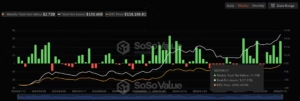In a significant setback for Solana’s decentralized finance (DeFi) landscape, the lending protocol Loopscale has paused its lending markets following a major exploit. On April 26, hackers executed a well-planned attack, stealing approximately $5.8 million, which included around 5.7 million USDC and 1200 Solana tokens. This incident, as reported by Loopscale’s co-founder Mary Gooneratne, accounted for nearly 12% of the platform’s total value locked (TVL), prompting immediate action to safeguard remaining assets.
Gooneratne revealed the details of the exploit through an announcement, clarifying that the attack specifically targeted Loopscale’s USDC and SOL vaults. The hacker exploited vulnerabilities by taking out a series of undercollateralized loans, which raises critical concerns about the security protocols in place for platforms offering similar financial products. Loopscale’s team is currently mobilized to investigate the breach, recover the lost funds, and ensure that users’ investments remain protected. They are working swiftly to restore repayment functionalities to avoid further unforeseen liquidations.
The 2025 blockchain landscape has already seen alarming statistics regarding security breaches, with over $1.6 billion worth of crypto stolen in just the first quarter. Most notably, over 90% of these losses were attributed to a well-coordinated $1.5 billion attack on ByBit conducted by the North Korean hacking group, Lazarus Group. This troubling trend highlights the urgent need for enhanced security measures across DeFi protocols, as the risks associated with cyber threats continue to grow.
Loopscale, which launched on April 10 after six months of closed beta testing, aims to redefine DeFi lending by enhancing capital efficiency through direct matching between lenders and borrowers. The protocol supports unique lending markets such as structured credit, receivables financing, and undercollateralized lending. Its innovative order book model stands in contrast to traditional liquidity pools used by other major DeFi projects like Aave, thereby presenting both advantages and vulnerabilities.
Currently, Loopscale boasts a TVL of approximately $40 million and has attracted a user base exceeding 7,000 lenders. Its main vaults for USDC and SOL are yielding attractive annual percentage rates (APRs) of over 5% and 10%, respectively. Additionally, Loopscale offers support for various tokens, including JitoSOL and BONK, and up to 40 different token pair strategies. However, as the current hack illustrates, the confidence of its user base hinges largely on the protocol’s ability to mitigate risks moving forward.
In light of these events, investors and users in the DeFi space must reevaluate their strategies and the platforms they choose to engage with. Loopscale’s recent challenges serve as a reminder of the critical importance of security and oversight in the rapidly evolving world of decentralized finance.







